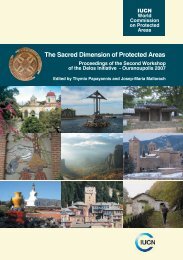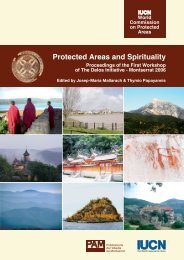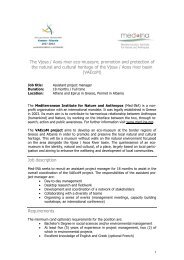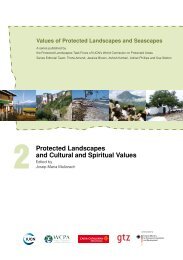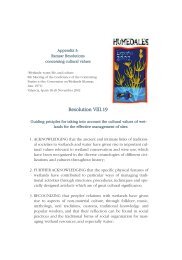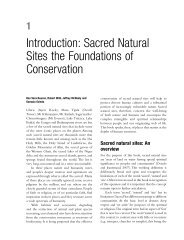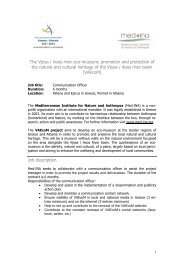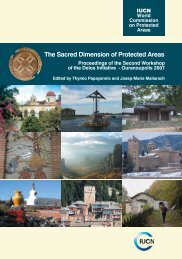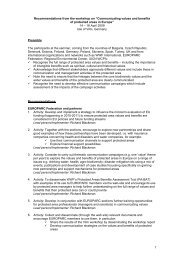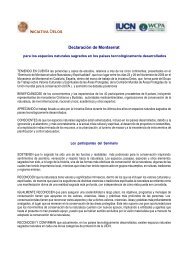The Diversity of Sacred Lands in Europe - IUCN
The Diversity of Sacred Lands in Europe - IUCN
The Diversity of Sacred Lands in Europe - IUCN
Create successful ePaper yourself
Turn your PDF publications into a flip-book with our unique Google optimized e-Paper software.
Additionally, the central concept <strong>of</strong> Islam<br />
is tawheed, which means Oneness<br />
<strong>of</strong> God. Everyth<strong>in</strong>g that exists<br />
comes from and depends on the one<br />
and only Creator. One <strong>of</strong> the names <strong>of</strong><br />
God <strong>in</strong> the Qur’an is Al-Haqq, which<br />
means both Truth and Reality. Allah is<br />
unity and this unity should be mirrored<br />
<strong>in</strong> the relation between humans and<br />
the natural world. It is the duty <strong>of</strong> humans<br />
to safeguard this unity, by protect<strong>in</strong>g<br />
the <strong>in</strong>tegrity <strong>of</strong> the Earth, its flora<br />
and fauna, its wildlife and environment.<br />
It is their duty to preserve the<br />
balance and harmony <strong>in</strong> Allah’s creation<br />
(Norcliffe, 1999).<br />
Given that humans are khalifah-guardians,<br />
they are also accountable for<br />
their actions and their omissions – as<br />
responsibility is a direct consequence<br />
<strong>of</strong> this status. On the Day <strong>of</strong> Reckon<strong>in</strong>g,<br />
Islam teaches that everyone created<br />
by Allah will return to Allah for Judgment<br />
and humans will be judged for<br />
the way they treated what was entrusted<br />
to them. This concept is called akhirah<br />
– the Hereafter and describes the<br />
accountability <strong>of</strong> the khalifah. Moreover,<br />
it is clearly stated <strong>in</strong> the Qur’an<br />
that Allah <strong>in</strong>vites everyone to enjoy the<br />
fruits <strong>of</strong> the earth, but to avoid excess<br />
lead<strong>in</strong>g to waste, ‘for Allah does not<br />
love wasters’ (ARC, 2011).<br />
<strong>The</strong> concepts <strong>of</strong> trusteeship, unity, accountability<br />
and the avoidance <strong>of</strong><br />
wastefulness are the ma<strong>in</strong> pr<strong>in</strong>ciples <strong>of</strong><br />
the environmental ethics <strong>of</strong> Islam. <strong>The</strong>y<br />
are not abstract values, but they are all<br />
translated <strong>in</strong> practical directions on<br />
how to live, <strong>in</strong>cluded <strong>in</strong> Shari’ah, the<br />
sacred law <strong>of</strong> Islam, and the Sunna, the<br />
example set by the Prophet Muhammad,<br />
compiled <strong>in</strong> his Hadith (say<strong>in</strong>gs).<br />
For example, there are laws <strong>in</strong> the<br />
Shari’ah mandat<strong>in</strong>g animal’s protection<br />
and avoid<strong>in</strong>g all form <strong>of</strong> cruelty, as well<br />
as the conservation <strong>of</strong> forests. <strong>The</strong><br />
prophet Muhammad established large<br />
reserves around Mecca and Med<strong>in</strong>a<br />
where all liv<strong>in</strong>g be<strong>in</strong>gs are protected.<br />
Accord<strong>in</strong>g to his say<strong>in</strong>g: ‘Whosoever<br />
plants a tree and diligently looks after it<br />
until it matures and bears fruit is rewarded’<br />
and ‘If a Muslim plants a tree<br />
or sows a field and men and beasts<br />
and birds eat from it, all <strong>of</strong> it is a charity<br />
on his part’ (Norcliffe, 1999).<br />
Orig<strong>in</strong>s <strong>of</strong> the Alevi-Bektashi<br />
orders<br />
<strong>The</strong> ‘Alevi-Bektashi’ is a term used for<br />
a large number <strong>of</strong> different heterodox<br />
communities, spread <strong>in</strong> the Anatolia region,<br />
the Balkans and other parts <strong>of</strong><br />
the world. In Turkey alone, where they<br />
number at least 15 million, they are divided<br />
by ethnicity (Kurdish, Turkic and<br />
Arabic Alevis) and language (speak<strong>in</strong>g<br />
Turkish, Kurdish, Kurmanji, Zaza and<br />
Arabic) (Ignatov, 2008).<br />
Although some Bektashi scholars and<br />
Alevis believe that there are certa<strong>in</strong> differences<br />
and variances, they have<br />
been generally regarded as parts <strong>of</strong> an<br />
<strong>in</strong>tegrated Alevi-Bektashi culture (Mavrommatis,<br />
2008; Kress<strong>in</strong>g, 2002; Doja,<br />
2006a, Melik<strong>of</strong>f, 1998). In the past,<br />
Alevis lived <strong>in</strong> rural or more isolated areas,<br />
while the Bektashis lived <strong>in</strong> urban<br />
centres. Today the name ‘Alevi’ is usually<br />
used <strong>in</strong> Turkey, and the name ‘Bek-<br />
97



